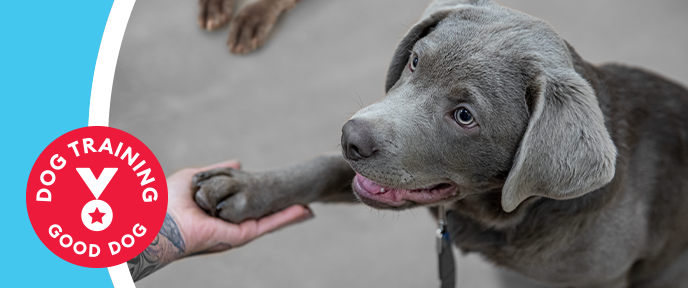Crucial Tips and Techniques for Mastering Dog Educating in your home
Mastering pet training in your home needs a calculated method. Perseverance, consistency, and positivity are vital parts. Establishing a regular helps develop a complacency for the pet. Making use of positive reinforcement builds depend on and interaction. However, several proprietors battle with maintaining interest and involvement throughout training sessions. Comprehending how to browse these challenges can lead to a lot more efficient training results. What strategies might be most helpful in overcoming these usual barriers?
Develop a Regular Routine
When training a pet, establishing a regular regimen is vital for cultivating great habits and a strong bond between the proprietor and pet dog. An organized routine gives pet dogs with a complacency, helping them recognize what to expect each day. Normal feeding times, workout, and training sessions create a foreseeable environment, which can minimize anxiety and promote a feeling of security.
Proprietors ought to intend to include daily tasks at the exact same time to strengthen this regimen. Early morning strolls, playtime, and training workouts must happen continually. Additionally, incorporating commands and cues throughout these activities can additionally enhance understanding.
Usage Favorable Support
A constant routine lays the foundation for reliable training, however the approaches utilized throughout training sessions considerably influence a pet dog's learning experience. Favorable reinforcement emerges as a powerful tool fit wanted actions. This strategy includes compensating a dog for showing certain activities, efficiently encouraging them to repeat those habits (Dog Training Near Me). Incentives can include deals with, praise, or playtime, developing a favorable organization with the action done
Using positive support promotes a bond of trust fund in between the dog and instructor, boosting communication and understanding. It is vital to supply incentives quickly after the desired actions to reinforce the connection. Consistency in applying this strategy guarantees the canine can plainly connect the habits with the reward. Avoiding penalty or negative support can lead to a much more confident and enthusiastic student. By concentrating on positive reinforcement, trainers can produce a helpful environment where pets grow and learn successfully.
Keep Training Sessions Short and Enjoyable
Effective dog training calls for keeping sessions brief and appealing to preserve the canine's interest and excitement. Commonly, sessions ought to last no longer than 10 to 15 minutes, as pet dogs have actually restricted focus periods. By focusing on brief intervals, fitness instructors can avoid frustration for both the canine and the handler, improving the discovering experience.
Incorporating play and positive interactions into training can make sessions satisfying. Utilizing toys, deals with, or praise as benefits not just encourages the canine but likewise reinforces the bond between the animal and fitness instructor. Altering activities often can also help maintain the pet dog's rate of interest alive, as varied tasks promote psychological interaction.
Finishing each session on a favorable note, such as commemorating a tiny victory, guarantees the pet links training with enjoyable. Inevitably, keeping training sessions short and delightful promotes reliable discovering and strengthens the overall training procedure.
Establish Realistic Goals
Establishing practical goals is necessary for effective pet training. Fitness instructors ought to start by examining their canine's behavior tendencies and existing skills, allowing them to develop attainable purposes. As an example, instead of intending for complex commands, beginning with fundamental cues like "rest" or "stay" can cultivate a sense of accomplishment.
Furthermore, breaking down larger objectives right into smaller, convenient steps assists maintain motivation for both the trainer and the pet. This method additionally enables changes along the way, ensuring that obstacles do not become overwhelming.
It is vital to recognize that each pet learns at its very own speed; patience is crucial. Maintaining expectations grounded helps stop aggravation and motivates regular progression. Dog Training Near Me. In conclusion, setting reasonable objectives not just boosts the training experience yet additionally strengthens the bond between the trainer and the canine, causing a much more unified and efficient training trip
Mingle Your Pet
Attaining realistic training objectives lays the foundation for an all-round dog, however socialization plays a considerable role in a pet's development. Socializing a pet entails revealing it to numerous settings, individuals, and other animals, which helps to develop confidence and reduce anxiousness. Early socializing, preferably between three and fourteen weeks old, is important for shaping a dog's actions and personality. This exposure enables canines to learn appropriate communications and establish essential social skills.
Owners need to introduce their dogs to various scenarios slowly, guaranteeing each experience is positive and rewarding. Visiting parks, participating in young puppy classes, or arranging playdates with various other pet dogs can facilitate these communications. Furthermore, learning and observing various other dogs from their actions can even more boost a pet dog's social skills. Eventually, consistent and favorable socialization fosters a well-adjusted pet that conveniently browses various social setups throughout its life.
Be Client and Relentless

Additionally, perseverance is crucial. Normal practice strengthens commands and behaviors, making sure that the dog maintains what has actually been learned. It is essential to commemorate small victories, as they urge both the proprietor and the pet to keep advancing. Acknowledging obstacles as component of the journey as opposed to failures can assist keep inspiration. Eventually, a patient and persistent method not only develops a more powerful bond between pet dog and proprietor yet additionally lays the foundation for effective training and long lasting obedience.

Incorporate Educating Into Life
Including training right into day-to-day life can boost a dog's knowing experience. Regular activities, such as feeding or strolling, present beneficial chances for positive support. By flawlessly mixing training with daily activities, owners can grow better actions in their pets over time.
Daily Regimen Integration
Just how can canine owners perfectly mix training into their daily regimens? By integrating training sessions right into everyday activities, owners can improve their dog's learning experience. Simple commands can be practiced during strolls, such as "rest" before crossing roads or "heel" while steering with parks. Feeding time presents another chance; proprietors can incorporate commands like "wait" or "leave it" prior to providing the food dish. In addition, playtime can function as a training ground for commands like "bring" or "drop it." Consistency is crucial; by embedding training into routine activities, pets learn that commands are appropriate in different contexts. This method not just strengthens understanding however also reinforces the bond between the pet dog and its proprietor.
Positive Reinforcement Opportunities
Training opportunities are plentiful throughout a pet's every day life, especially when integrated with favorable reinforcement methods. Daily activities offer minutes for training, such as throughout walks, feeding times, or play sessions. As an example, awarding a dog for sitting prior to receiving food boosts obedience while cultivating a positive association with commands. Applauding a dog for steadly welcoming guests enhances desirable habits. Integrating training into playtime, like using bring to practice commands, can also be efficient. Owners should continue to be consistent, utilizing treats, praise, or playthings as benefits to motivate etiquette. By integrating training seamlessly into day-to-day regimens, proprietors Learn More Here can grow a mannerly pet while reinforcing their bond, making the training procedure pleasurable for both events.
Frequently Asked Concerns
What Age Is Ideal to Begin Educating My Canine?
Identifying the very best age to begin training a pet varies; nonetheless, specialists often suggest beginning around eight weeks. Early training promotes socializing, develops regimens, and assists form favorable behaviors, advertising a well-adjusted, obedient buddy.
Exactly How Can I Stop My Dog From Barking Excessively?
To reduce excessive barking, one reliable strategy entails identifying triggers, supplying regular training commands, and fulfilling silent habits. Additionally, regular exercise and psychological excitement can aid lessen unnecessary barking click here to read by attending to monotony or anxiety.
What Should I Do if My Pet Comes To Be Aggressive?
When a dog presents aggressiveness, it is important to continue to be calm and avoid conflict. Determining triggers, seeking specialist help, and employing favorable reinforcement techniques can properly handle and reduce hostile actions in pet dogs.
Exactly how Do I Choose the Right Training Tools?
Choosing the ideal training tools includes examining the canine's character, training, and size goals. Study different alternatives, get in touch with professionals, and prioritize humane, effective devices that advertise positive support for an effective training experience.

Can I Train My Pet Dog Without Expert Assistance?
Educating a dog without expert aid is feasible for many proprietors. With commitment, persistence, and regular practice, individuals can successfully teach basic commands and reinforce favorable habits, fostering a solid bond in between them and their animal.
A consistent routine lays the groundwork for effective training, however the approaches utilized during training sessions considerably affect a pet dog's understanding experience. Efficient pet training calls for keeping sessions brief and engaging to maintain the canine's attention and interest. Achieving realistic training objectives lays the foundation for a well-shaped canine, however socializing plays a substantial role in a pet's development. Additionally, finding out and observing various other pets from their actions can better improve a pet dog's social skills. Picking the right training devices includes assessing the pet dog's personality, size, and training objectives.